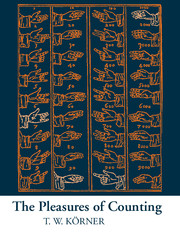Book contents
- Frontmatter
- Contents
- Preface
- I The uses of abstraction
- II Meditations on measurement
- III The pleasures of computation
- IV Enigma variations
- 13 Enigma
- 14 The Poles
- 15 Bletchley
- 16 Echoes
- V The pleasures of thought
- Appendix 1 Further reading
- Appendix 2 Some notations
- Appendix 3 Sources
- Bibliography
- Index
- Acknowledgements
16 - Echoes
Published online by Cambridge University Press: 05 May 2014
- Frontmatter
- Contents
- Preface
- I The uses of abstraction
- II Meditations on measurement
- III The pleasures of computation
- IV Enigma variations
- 13 Enigma
- 14 The Poles
- 15 Bletchley
- 16 Echoes
- V The pleasures of thought
- Appendix 1 Further reading
- Appendix 2 Some notations
- Appendix 3 Sources
- Bibliography
- Index
- Acknowledgements
Summary
Hard problems
At the end of the war, the British Government wished to hide two interlocked secrets – the fact that it and its American allies could read codes used by many other nations (there was a nourishing market in second-hand German Enigma machines) and the darker, greater secret, of how nearly the submarine war had ended in defeat†. Although thousands of people had worked in or with Bletchley, the secret was kept for 30 years. By the time the truth leaked out, the British had, finally, started to lose interest in their finest hour, and, in any case, there was hardly room for a homosexual pure mathematician in the pantheon of saviours of the nation‡.
However, fame, for mathematicians, consists in having their theorems remembered and their names mis-spelt. That Turing achieved this distinction in his own lifetime is revealed by the glossary of a 1953 book on computers.
Türing Machine. In 1936 Dr Turing wrote a paper on the design and limitations of computing machines. For this reason they are sometimes known by his name. The umlaut is an un-earned and undesirable addition, due presumably to an impression that anything so incomprehensible must be Teutonic.
Turing also has the much rarer distinction, for a mathematician, of a first-class biography. Hodges' book [96] is a labour of love which had the unexpected, but fortunately temporary, side-effect of turning its hero into a cultural icon.
- Type
- Chapter
- Information
- The Pleasures of Counting , pp. 391 - 410Publisher: Cambridge University PressPrint publication year: 1996



